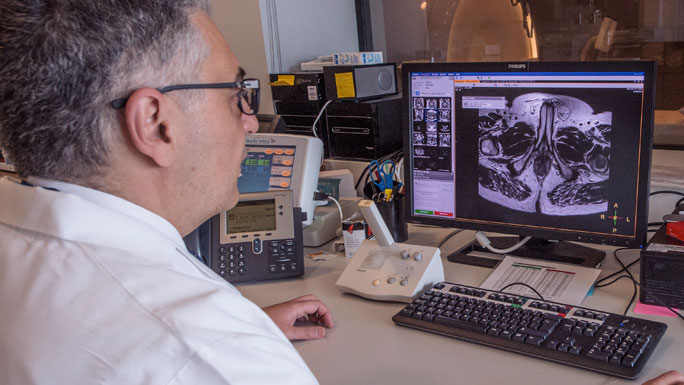Prostate MRI Services

Magnetic resonance imaging (MRI) is an advanced tool in the arsenal of diagnostic options for prostate cancer.
At the University of Chicago Medicine, we offer three MRI methods to aid in the diagnosis, staging and ongoing surveillance of prostate cancer.
While prostate MRI may not be right for everyone, our team of radiologists, urologists, medical and radiation oncologists and pathologists collaborate to determine the best diagnostic and treatment methods for each patient.
By performing prostate MRIs, physicians at UChicago Medicine often can detect cancer in its early stages, resulting in improved outcomes for patients. Prostate MRI provides our team with highly focused images that specifically emphasize the prostate and nearby structures, such as lymph nodes.
Using state-of-the art 3 Tesla MRI scanners with an endorectal coil, a thin wire that sends magnetic waves of information about tissue, our physicians obtain prostate images of unsurpassed quality. During the procedure, patients are given contrast, a special MRI dye, which is absorbed by the body's tissues and allows physicians to identify any abnormal tissue, such as a tumor, by how it reacts to the contrast. For high-quality, in-depth results, we utilize multi-parametric MRI protocol, including T2-weighted imaging, diffusion-weighted imaging and dynamic contrast-enhanced imaging. These images are then interpreted by dedicated prostate imaging experts. The MRI should take between 45 minutes to an hour, and detailed reports of the examinations are prepared on the same day of the examination within hours upon completion of the MRI study.
Prostate MRIs offer a more comprehensive examination of the area than a standard X-ray. Our radiologists use sophisticated image-analysis software to help them interpret the MRI results.
Using state-of-the art 3 Tesla MRI scanners with an endorectal coil, a thin wire that sends magnetic waves of information about tissue, our physicians obtain prostate images of unsurpassed quality. During the procedure, patients are given contrast, a special MRI dye, which is absorbed by the body's tissues and allows physicians to identify any abnormal tissue, such as a tumor, by how it reacts to the contrast. For high-quality, in-depth results, we utilize multi-parametric MRI protocol, including T2-weighted imaging, diffusion-weighted imaging and dynamic contrast-enhanced imaging. These images are then interpreted by dedicated prostate imaging experts. The MRI should take between 45 minutes to an hour, and detailed reports of the examinations are prepared on the same day of the examination within hours upon completion of the MRI study.
Prostate MRIs offer a more comprehensive examination of the area than a standard X-ray. Our radiologists use sophisticated image-analysis software to help them interpret the MRI results.
UChicago Medicine is one of a few institutions that performs MRI-guided biopsies of suspected tumors in the prostate. For eligible patients, targeted biopsies offer a minimally invasive, highly accurate diagnosis for prostate cancer.
We perform MRI guided prostate biopsy using the Invivo DynaTrim device. During the procedure, an MRI-compatible needle sleeve is inserted three to four inches into the rectum. Using this imaging technology, your radiologist directs the sleeve into a position that best targets any suspected lesion using MR imaging guidance.
From there, a needle will be placed through the sleeve and theradiologist will obtain two to three tissue samples for analysis — far fewer samples than are needed with conventional prostate biopsies. The entire process should take between 30 to 60 minutes.
The tissue samples will allow physicians to determine the scope of your diagnosis and will help to best determine the right treatment plan.
We perform MRI guided prostate biopsy using the Invivo DynaTrim device. During the procedure, an MRI-compatible needle sleeve is inserted three to four inches into the rectum. Using this imaging technology, your radiologist directs the sleeve into a position that best targets any suspected lesion using MR imaging guidance.
From there, a needle will be placed through the sleeve and theradiologist will obtain two to three tissue samples for analysis — far fewer samples than are needed with conventional prostate biopsies. The entire process should take between 30 to 60 minutes.
The tissue samples will allow physicians to determine the scope of your diagnosis and will help to best determine the right treatment plan.
The MRI/ultrasound fusion biopsy combines the detection capabilities of the MRI with the real-time imaging of ultrasound to guide physicians directly to lesions during the prostate biopsy. Benefits of this minimally invasive procedure include significantly fewer needle biopsies as well as fewer false negative test results, as compared to conventional prostate biopsy.
A prostate MRI is taken initially, where radiologists identify areas in the prostate that could be potentially cancerous. If a biopsy is needed, our urology specialists will fuse annotated MRI images onto the live ultrasound images, enabling the physician to navigate directly to the lesions and/or suspicious areas. The urologist will obtain biopsy samples from those exact locations, and they will be examined to determine diagnosis and treatment.
A prostate MRI is taken initially, where radiologists identify areas in the prostate that could be potentially cancerous. If a biopsy is needed, our urology specialists will fuse annotated MRI images onto the live ultrasound images, enabling the physician to navigate directly to the lesions and/or suspicious areas. The urologist will obtain biopsy samples from those exact locations, and they will be examined to determine diagnosis and treatment.
In addition to our on-site supportive oncology services including mental health care, physical and occupational therapy, cancer nutrition and more, our program is affiliated with the Chicago chapter of Us Too - International Prostate Cancer Education & Support Network.

Cancer Care Second Opinions
Request a second opinion with a UChicago Medicine urologic cancer expert.

High Risk & Advanced Prostate Cancer Clinic
Focused care for men at risk for prostate cancer and those with advanced disease.

Participate in a Prostate Cancer Clinical Trial
UChicago Medicine physician-scientists are actively conducting clinical trials of new therapies for prostate cancer.
